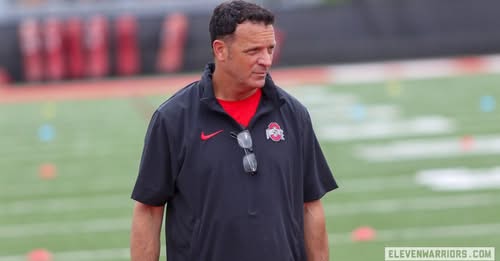Ohio State’s assistant athletic director of player personnel, Sam Petitto, is departing the program to take on a new role as LSU’s director of scouting and personnel strategy.
Sam Petitto’s departure from Ohio State marks another significant shift in the college football talent acquisition landscape. After serving as the Buckeyes’ assistant athletic director of player personnel, Petitto is now heading to LSU to become the Tigers’ director of scouting and personnel strategy—a move that not only affects two of the sport’s most recognizable brands but also signifies the growing chess match being played behind the scenes in modern recruiting. As the lines between NFL-style scouting departments and college football programs continue to blur, this transition is more than just a job change—it’s a reflection of how programs are evolving to compete in a high-stakes environment driven by data, evaluation, and strategic recruiting.
Petitto has long been respected in collegiate personnel circles, recognized for his keen eye for talent and ability to identify fits that extend beyond just athleticism. His role at Ohio State went far beyond the traditional responsibilities of player personnel. He was a key piece in the Buckeyes’ strategy room, assisting in long-range roster planning, helping to manage the transfer portal with surgical precision, and ensuring that the program stayed ahead in NIL-era dynamics. His expertise in aligning positional needs with recruiting timelines, both for high school talent and portal acquisitions, made him invaluable during one of the most rapidly evolving phases in college football history.
Petitto’s move to LSU reunites him with familiar territory and offers a new canvas for his strategic approach. While Ohio State has been a consistent playoff contender and national recruiting force, LSU represents an opportunity to help shape a team on the cusp of something greater. Under head coach Brian Kelly, the Tigers have made no secret of their ambition to return to national title relevance, and bringing in a seasoned talent strategist like Petitto speaks volumes about their commitment to that goal. LSU’s investment in the infrastructure around recruiting has grown exponentially in recent years, and Petitto’s arrival further sharpens their approach in an SEC landscape where even the smallest edge can lead to major gains.
The importance of the director of scouting and personnel strategy role cannot be overstated. In today’s climate, programs are no longer solely relying on traditional recruiting pipelines or high school film to build championship rosters. Scouting departments must now be as adept at evaluating character, academic fit, and off-field marketability as they are at identifying raw athletic potential. Petitto’s background equips him to thrive in this environment. His track record in managing databases, overseeing evaluation criteria, and maintaining strong relationships with high school and junior college coaches made him a powerful presence at Ohio State, and now LSU will benefit from that experience.
This move also reflects how college programs are placing greater emphasis on back-end talent architecture. Just a decade ago, a hire like this might have flown under the radar, noted only by a few industry insiders. Today, however, these types of personnel changes are as strategically significant as a position coach hire or even a coordinator switch. Petitto is expected to not only oversee LSU’s scouting operation but also help build a framework for long-term roster construction. That includes identifying gaps early, targeting players who can make immediate contributions, and minimizing transfer attrition by ensuring players are placed in systems where they can thrive.
For Ohio State, Petitto’s departure is a notable loss but also a testament to the caliber of people the Buckeyes have been able to attract and develop within their administrative ranks. Head coach Ryan Day and the program’s recruiting leadership have built a machine that churns out elite classes year after year, and the personnel department has been an integral part of that. While they will no doubt work swiftly to fill the vacancy, the loss of Petitto will be felt, especially in the continuity of the Buckeyes’ broader strategic efforts.
The timing of the move is also notable. With July being a critical month for recruiting evaluations, commitments, and campus visits, having a stable and experienced hand in charge of personnel is paramount. LSU will benefit immediately from Petitto’s ability to jump into the evaluation process, potentially influencing key late-summer decisions for the 2025 recruiting class and beyond. His knowledge of Big Ten recruiting philosophies, and specifically what has made Ohio State such a consistent power, could offer LSU a unique competitive advantage as they continue to battle Alabama, Georgia, Texas, and Florida State for top-tier talent.
Petitto’s experience isn’t confined to one region either. Over the course of his career, he’s developed a reputation for identifying talent nationally, with a network that spans across the South, Midwest, and West Coast. That national reach fits perfectly with LSU’s evolving identity under Brian Kelly, who has made a concerted effort to recruit beyond the traditional Louisiana and Gulf Coast strongholds. Petitto brings with him a blueprint that emphasizes both volume and precision—identifying high-upside players early while also capitalizing on late bloomers and transfer portal gems.
This hire may also suggest LSU is anticipating further shifts in the recruiting ecosystem. With continued litigation and legislation surrounding NIL and revenue sharing, having a personnel director who understands how to align strategic roster building with financial realities could become a defining advantage. Petitto’s ability to synthesize athletic performance, academic profile, NIL value, and positional fit makes him an ideal candidate for a role that requires both vision and discipline. LSU is not just hiring a recruiter—they’re bringing in an architect.
At the same time, this transition will require adjustments. Petitto is leaving a place where he had built established systems, understood the culture, and had access to one of the nation’s most elite infrastructures. At LSU, he will be tasked with bringing that level of sophistication to a new setting, which includes integrating with existing staff, adapting to different leadership styles, and aligning his vision with Brian Kelly’s program philosophy. The success of this move will hinge not only on his recruiting chops but on how well he can implement a cohesive scouting philosophy that spans multiple departments and connects directly to the field.
As college football continues to professionalize, the lines between front-office roles in the NFL and similar positions at the collegiate level continue to blur. Petitto’s move is emblematic of that shift. Programs are realizing that winning in January and December starts with the work done in May, June, and July. By investing in people who can connect talent evaluation with program culture, schools like LSU are positioning themselves to succeed not just in the short term, but for years down the line.
There’s also a human element to this story. For Petitto, this move represents a new challenge, a fresh opportunity to make his mark at another blueblood program with immense potential. He leaves behind relationships, mentors, and a fanbase that respected the work he did. In return, he walks into a role where expectations will be high but the opportunity to build something enduring is very real. The stakes are enormous, but so too is the reward. For LSU, this is a statement of intent. For Ohio State, it’s a moment to regroup and reaffirm their commitment to staying at the top. For Sam Petitto, it’s the next step in a career that continues to rise alongside the evolving demands of the sport he’s helped shape behind the scenes.



